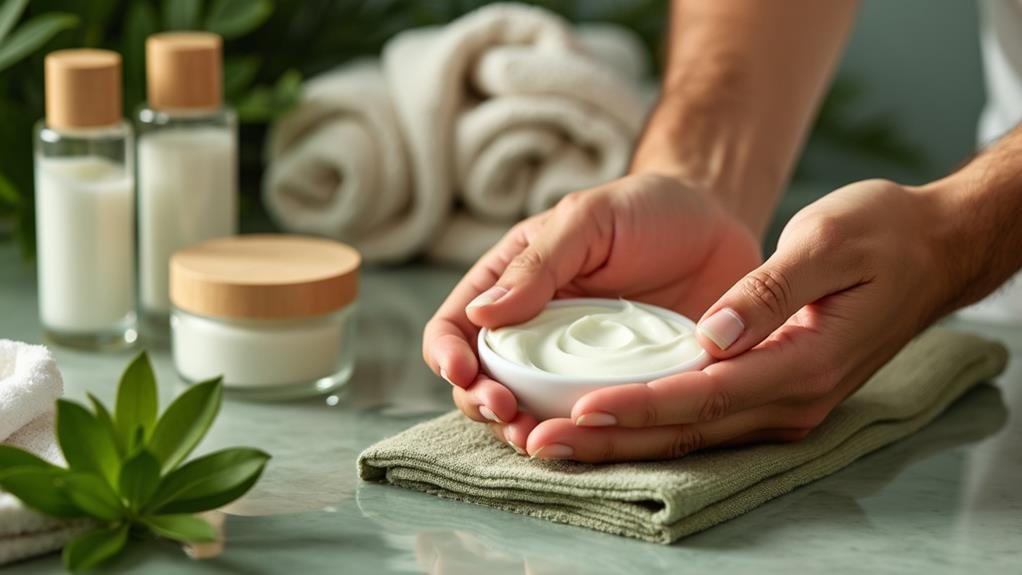
If you've got sensitive skin, gentle skincare is essential. First, identify your skin type to choose suitable products. Opt for cream cleansers that hydrate without irritation and stick to fragrance-free items to prevent reactions. Always patch test new products to ensure they're safe for your skin. Daily moisturizing is key; select ones with soothing ingredients like aloe vera or chamomile. Limit exfoliation to 1-3 times a week using gentle chemical exfoliants, and avoid hot water to prevent dryness. For tailored advice, consider consulting a dermatologist. You'll discover even more practical tips for maintaining your skin's health and comfort.
Key Takeaways
- Identify your skin type and triggers to create a personalized skincare routine that minimizes irritation and promotes balance.
- Choose fragrance-free and gentle cleansers suitable for sensitive skin, such as cream or herbal cleansers, to avoid irritation.
- Perform patch testing on new products to prevent allergic reactions and monitor for irritants like alcohol and preservatives.
- Daily moisturization with soothing ingredients like aloe vera and shea butter is essential for maintaining hydration and skin health.
- Always use broad-spectrum sunscreen to protect sensitive skin from UV damage, and opt for mineral sunscreens when possible.
Understand Your Skin Type
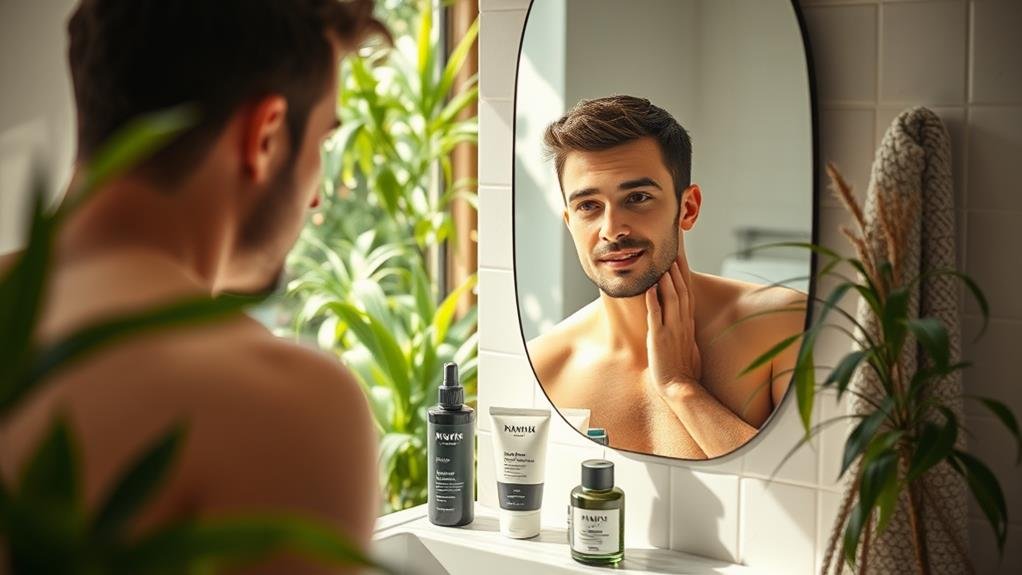
How well do you know your skin type? Understanding your skin type is crucial for crafting an ideal skincare routine that caters to your unique needs. Your skin can be categorized into several types—normal, oily, dry, combination, or sensitive. Each type reacts differently to various products and environmental factors.
If you have sensitive skin, it's essential to identify skin sensitivity triggers, such as certain ingredients, weather changes, or stress. This awareness will empower you to select products that minimize irritation and enhance your skin's natural resilience.
To determine your skin type, you can perform a simple test: cleanse your face and wait for an hour. Observe how your skin feels—if it's tight or flaky, you might've dry skin. If it's shiny, you're likely oily. Combination skin displays both characteristics, while sensitive skin will usually react negatively to harsh products.
Once you know your skin type, you can create an ideal skincare routine that addresses your specific concerns, ensuring your skin remains healthy, balanced, and free from irritation.
Embrace this knowledge, and take charge of your skincare journey!
Choose the Right Cleanser
Selecting the right cleanser is vital for maintaining your skin's health and appearance. With sensitive skin, you need to choose a product that cleanses without causing irritation. Here's a quick guide to help you decide:
| Cleanser Type | Best For |
|---|---|
| Gel Cleansers | Oily skin, lightweight feel |
| Cream Cleansers | Dry or sensitive skin |
| Foaming Cleansers | Combination skin |
| Herbal Cleansers | Natural, soothing properties |
Gel cleansers provide a refreshing cleanse without stripping moisture, making them ideal for oily skin. If you have dry or sensitive skin, opt for cream cleansers that hydrate while effectively removing impurities. Foaming cleansers work best for combination skin, offering a burst of freshness without over-drying. Lastly, herbal cleansers often comprise natural ingredients that soothe irritation and promote overall skin health.
Ultimately, your choice should align with your skin type and personal preference. By selecting the right cleanser, you'll create a solid foundation for your skincare routine, enhancing your skin's appearance and comfort.
Opt for Fragrance-Free Products
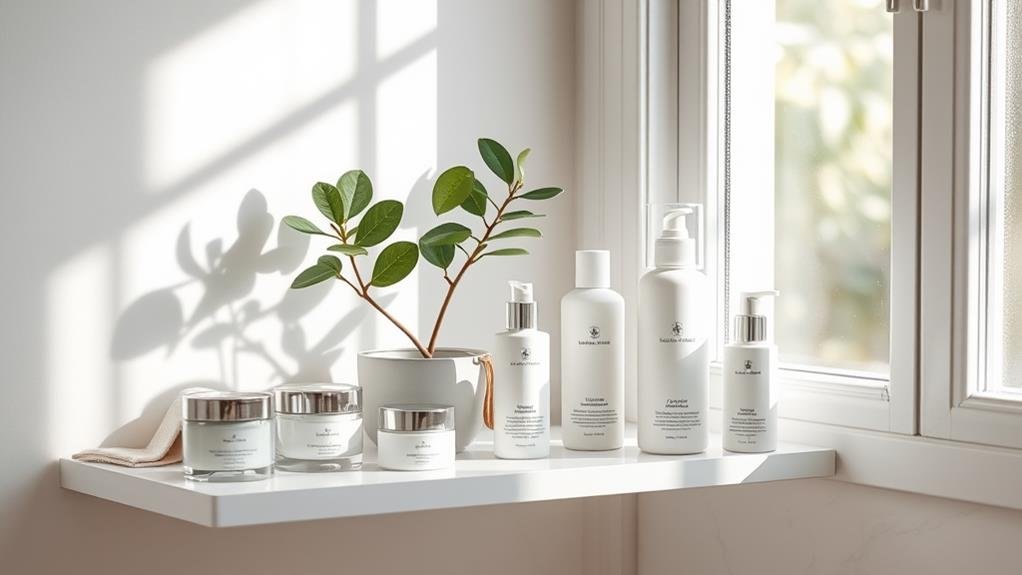
When it comes to skincare, opting for fragrance-free products can make a significant difference, especially for those with sensitive skin. Many men experience fragrance sensitivity, which can lead to irritation, redness, or breakouts. By choosing scent-free options, you minimize the risk of adverse reactions that can disrupt your skincare routine.
Fragrance-free doesn't mean you have to compromise on effectiveness. In fact, many fragrance-free products are formulated with gentler ingredients that nourish and protect your skin without causing irritation. Look for labels that explicitly state "fragrance-free" or "unscented," as these terms ensure that no added fragrances are included.
Additionally, avoiding fragrances allows your skin to breathe and remain balanced. Many products contain harsh chemicals and synthetic fragrances that can strip your skin of its natural oils. By selecting scent-free options, you're allowing your skin to maintain its natural moisture barrier, leading to healthier skin overall.
Test New Products Patchwise
Before diving into a new skincare product, it's crucial to test it patchwise. This simple step can save you from potential irritations or allergic reactions, especially if you have sensitive skin.
Start by applying a small amount of the product on a discreet area, like your inner wrist or behind your ear. Wait 24 to 48 hours to see if any adverse reactions occur, such as redness, itching, or swelling.
When testing, pay attention to the product ingredients. Some components, even in seemingly benign products, can trigger sensitivities.
Look for common irritants, like alcohol, certain preservatives, or strong active ingredients. If you notice any negative reactions during patch testing, it's a clear signal to avoid that product.
Moisturize Daily for Hydration
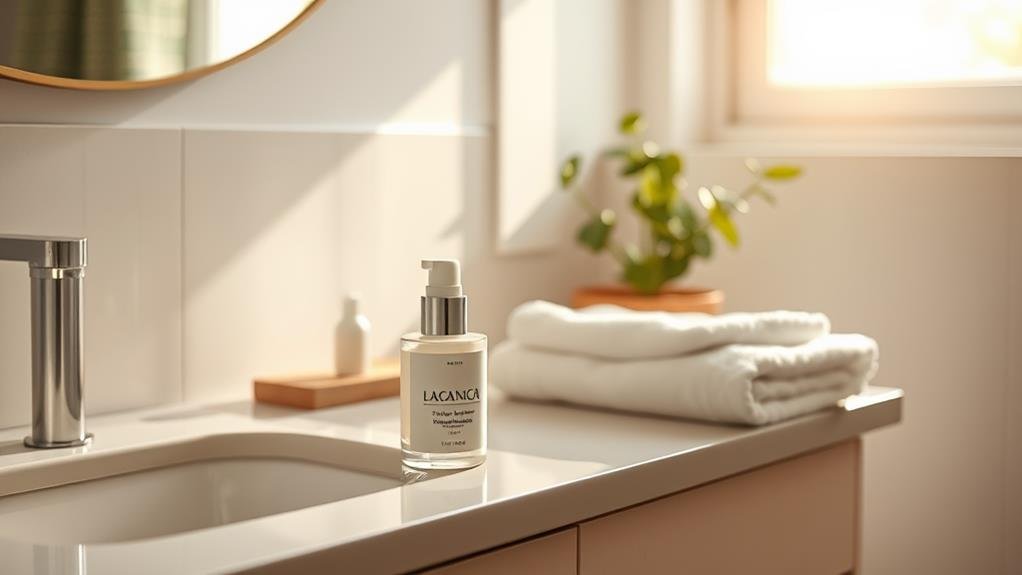
After ensuring that your skin reacts positively to new products, the next step in your skincare routine should focus on hydration.
Moisturizing daily is crucial for maintaining your skin's health, especially if you have sensitive skin. By incorporating the right moisturizer into your daily routine, you can enjoy numerous hydration benefits, including improved elasticity and a smoother complexion.
To help you choose the best moisturizer for your needs, consider these four tips:
- Look for Natural Ingredients: Opt for moisturizers containing aloe vera, hyaluronic acid, or shea butter, as these ingredients provide gentle hydration without irritation.
- Choose a Non-Comedogenic Formula: This ensures your moisturizer won't clog your pores, which is essential for sensitive skin.
- Apply After Cleansing: Lock in moisture by applying your moisturizer immediately after washing your face to maximize hydration.
- Don't Skip Day and Night: Consistency is key; apply moisturizer both in the morning and evening to maintain optimal hydration levels throughout the day.
Use Sunscreen Every Day
Every day, regardless of the weather, applying sunscreen is essential for protecting your skin from harmful UV rays. Even on cloudy days, up to 80% of UV rays can penetrate the clouds, making daily sunscreen application vital. By incorporating this simple habit into your routine, you can significantly reduce the risk of skin damage and premature aging.
To ensure you're getting the best UV protection, consider the following:
| Sunscreen Type | SPF Rating | Application Tips |
|---|---|---|
| Chemical Sunscreen | 30+ | Apply 15 minutes before sun exposure |
| Mineral Sunscreen | 30+ | Reapply every 2 hours, especially after sweating or swimming |
| Tinted Sunscreen | 30+ | Use as a daily moisturizer for added protection |
| Spray Sunscreen | 30+ | Ensure even coverage, and don't forget areas like your ears and neck |
Make it a point to use a broad-spectrum sunscreen that shields against both UVA and UVB rays. Remember, regular sunscreen application not only maintains your skin's health but also allows you to enjoy life outdoors without worry.
Limit Exfoliation Frequency
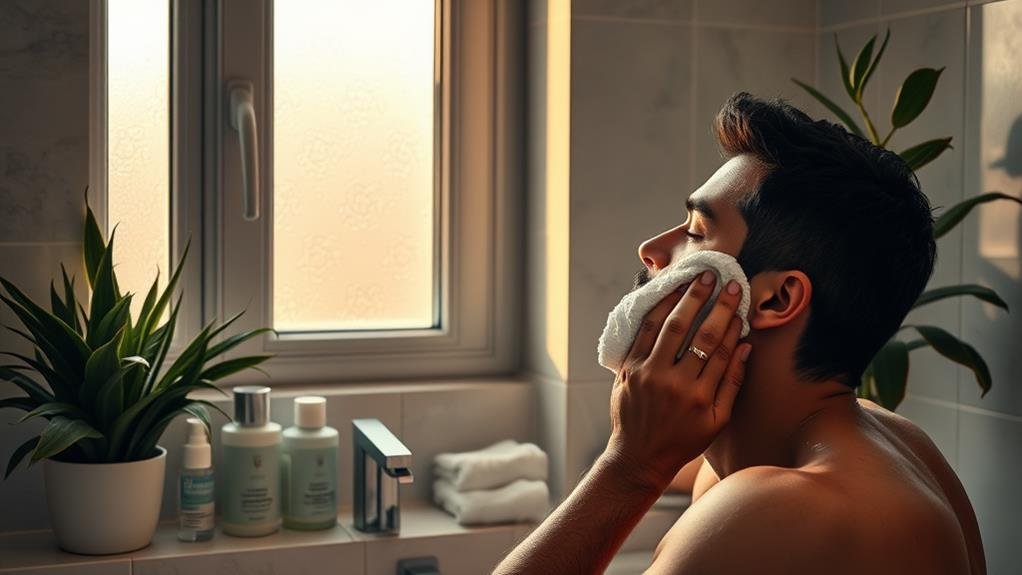
Exfoliating your skin can work wonders for removing dead cells and revealing a fresher complexion, but overdoing it can lead to irritation and damage.
To maintain a healthy skin barrier, it's crucial to limit the frequency of your exfoliation. Here are some guidelines to help you find the right balance:
- Frequency: Aim to exfoliate 1-3 times a week, depending on your skin's sensitivity and the exfoliation techniques you use.
- Type of Exfoliant: Choose gentler options like chemical exfoliants (AHAs or BHAs) over harsh physical scrubs that can disrupt your skin barrier.
- Listen to Your Skin: If you notice redness, dryness, or irritation, scale back your exfoliation routine immediately.
- Moisturize Immediately: After exfoliating, always apply a hydrating moisturizer to support your skin barrier and lock in moisture.
Avoid Hot Water Rinses
Often overlooked, the temperature of the water you use during your skincare routine can significantly impact your skin's health.
Hot water may feel soothing, but it can disrupt your skin temperature, leading to irritation and dryness, especially if you have sensitive skin. It strips away natural oils, which are essential for maintaining a healthy barrier.
Instead, opt for lukewarm water. This helps clean your skin without compromising its delicate balance.
Lukewarm water is gentler, allowing you to wash away dirt and impurities without causing excessive dryness or irritation.
The right water quality also plays a vital role; ensure you're using clean, filtered water to avoid introducing additional irritants into your skincare routine.
Incorporate Soothing Ingredients
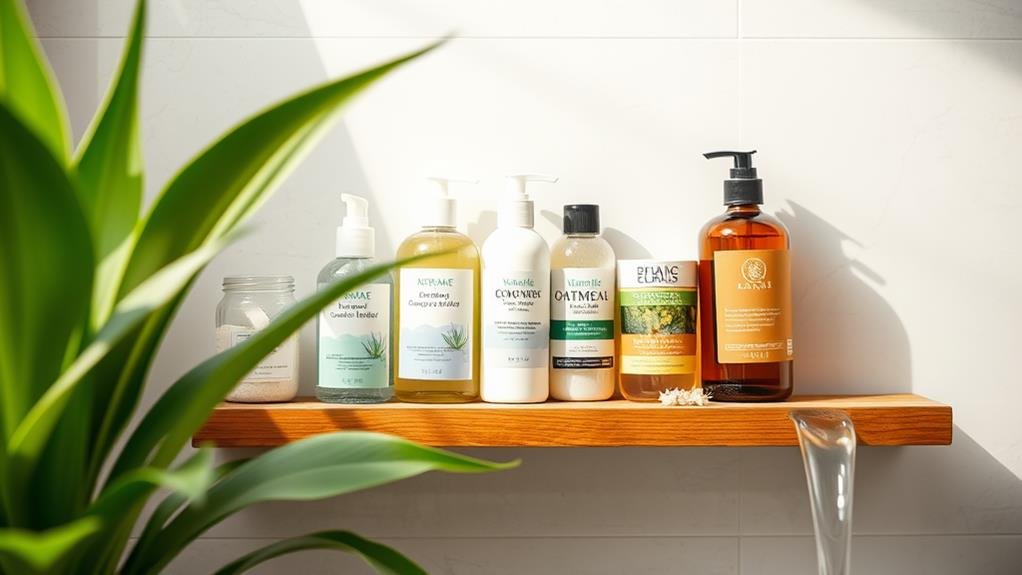
When it comes to achieving healthy skin, incorporating soothing ingredients into your skincare routine is crucial. These components help calm irritation, reduce redness, and promote overall skin health.
Here are four essential soothing ingredients you should consider:
- Jojoba Oil: This soothing oil closely resembles your skin's natural sebum, helping to hydrate without clogging pores. It's perfect for reducing inflammation.
- Aloe Vera: Known for its calming properties, aloe vera gel hydrates and soothes irritated skin. It's particularly effective after shaving, providing relief from razor burn.
- Chamomile Extract: A powerful calming botanical, chamomile helps to reduce redness and irritation. Look for products containing this ingredient to promote a more even skin tone.
- Calendula Oil: This soothing oil is derived from marigold flowers and is excellent for healing and soothing sensitive skin. It has anti-inflammatory properties that can help minimize discomfort.
Consult a Dermatologist
Seeking professional guidance can be a game-changer for your skincare journey. When you have sensitive skin, understanding its unique needs is crucial. A skin consultation with a qualified dermatologist allows you to explore personalized solutions tailored to your specific concerns.
They can assess your skin type and identify any underlying conditions that may be causing irritation or discomfort. Dermatologist recommendations often include specialized products that are gentle yet effective.
You'll get insights into what ingredients to look for and what to avoid, ensuring that you don't waste time or money on unsuitable products. Furthermore, a dermatologist can help you establish a routine that minimizes flare-ups and promotes overall skin health.
Don't underestimate the power of professional advice. Whether you're dealing with persistent redness, dryness, or other sensitivities, a dermatologist's expertise can lead to significant improvements.
They'll guide you through the maze of skincare options, empowering you to make informed choices that align with your lifestyle. So, take the step to consult a dermatologist and unlock the freedom to enjoy healthier, more resilient skin.
Your journey to effective skincare starts here.
Conclusion
Taking care of your sensitive skin doesn't have to be complicated. Remember, "an ounce of prevention is worth a pound of cure." By understanding your skin type, choosing the right products, and incorporating soothing ingredients, you can maintain a healthy complexion. Daily moisturizing and gentle cleansing are key, while limiting exfoliation will keep irritation at bay. When in doubt, consult a dermatologist for personalized advice. Your skin deserves the best care, so invest in it wisely.
